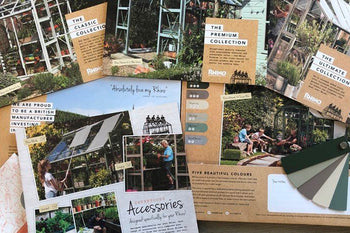The weather has taken a pleasant turn as we head into May and the sunshine just couldn’t have arrived soon enough. My seedlings have put on some really speedy growth, finally basking in the warmth and sun inside the Rhino Greenhouse. As a very patient gardener, I rarely sow seeds much before March or even later and this year in particular since it was so cold, my seed sowing was really quite late. But, as always, they soon catch up and are raring to go!
The Rhino Greenhouse really has been a place of joy over the past few windy, wet weeks because it wasn’t just the young plants happy to be hidden inside - but me also! Desperate to get my hands dirty and seed sown in April, I was able to get some sowing tasks done under cover in the greenhouse.
After a wet season it’s good practice to keep a close eye out for pests and diseases in the garden as the weather warms up so if you do spot something you can get things under control as soon as possible.
Things to look out for example are chafer grubs which eat grass roots, so if your lawn is looking yellow and patchy have a look beneath a piece of turf for the white/creamy larvae. Usually, birds will peck at the lawn to retrieve them for food but if you have a larger infestation, nematodes can be applied. I haven’t ever dealt with chafer grubs myself but if I did, I would leave them until they have burrowed deeper into the soil before pupating and then replace the turf, reseed and apply some sand mixed with topsoil.
Ants are common at this time of year and throughout summer, but there is little need to do anything because they usually just go about their business. Even in the greenhouse, I have had quite a few ants in the past but having left them be, they tend to move on at some point.
One bug that is pretty ferocious is the red lily beetle. This is one to watch out for because they will eat through lily foliage in no time at all! They are bright red and can’t be mistaken for anything else (very different shape to Ladybirds and no spots), but they are evasive. If they see you looking, they fall into the soil beneath and hide! I have had red lily beetles for years, so I have stopped growing lilies altogether.
If your broad beans or other new shoots have black fly, a simple squirt with the hose will knock them off, you can pinch out the top shoots or you can leave them! Yes…the ladybirds will come and enjoy the feast doing the job for you.
Keep on top of weeding before it runs away with itself. Despite my initial dislike of the job, I do find when I get stuck in that it can be quite therapeutic. I am still leaving plenty of beneficial weeds such as daisies and dandelions and just focusing on clearing the beds to be cultivated.
It’s such a busy but enjoyable month in the garden. Don’t forget to give some larger perennials the Chelsea chop if needed and mostly … happy gardening!








